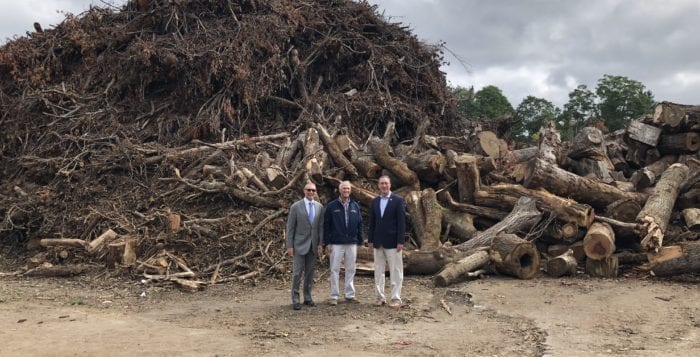Huntington town highway department: We have no equipment money

Following passage of two major bills to support local roadways, state Sen. Jim Gaughran (D-Northport) and Assemblyman Steve Stern (D-Dix Hills) joined the Town of Huntington Highway Superintendent Kevin Orelli at the Huntington Highway Department to emphasize the importance of improving conditions for Huntington’s highways and drivers.
The first set of bills, S.4363 and A.6547, raises the limits on capital expenditures used for the repair and improvement of highways in the town from $400,000 to $1,000,000, bringing it in line with neighboring municipalities. The second set, S.5422 and A.1235, protects drivers by expanding the state’s liability for damages suffered by individuals due to defects in state highways.
“It’s a step in the right direction, but I have no money.”
— Kevin Orelli
Orelli stressed the fact that the capital expenditure bill is not about getting more money from the state, adding it instead addresses an archaic rule that prevents the Highway Department from spending more than $400,000 in one year on equipment spending. The town, he said in a telephone interview, has fallen behind and is badly in need of new equipment, which is funded by the town and taxpayers.
“I thank the legislators for their work,” Orelli said. “It’s a step in the right direction, but I have no money.” The town allocated no monies for equipment in this year’s budget, he said.
“We don’t have the money we need to do the job properly. We can’t do what we need to do,” he said.
The department recently retired around five snowplows and has been using antiquated equipment to repair potholes, It lacks basic machinery such as a chip truck, pay loader and a brine truck. A new super sucker, which the town needs to clean out storm drains, the highway superintendent said, costs $408,000.
The Highway Department, he said, has been the department that gets budget cuts. Over time, it’s gradually fallen behind. The department once employed 300 people, but now operates with a staff of 150, Orelli said. The highway building itself, he said, is old and has too low of a clearance for some trucks to park inside for repair work.
State lawmakers said that they understand the situation has been decades in the making.
“These bills are important protections to allow safe and swift repair of our local roadways and to our motorists,” Gaughran said. “S.4363 modernizes an arcane statute and allows the town to respond quickly and appropriately during an emergency.”
Stern agrees.
“The bill helps ensure that the Huntington highway superintendent has the resources necessary to maintain the quality and safety of our roadways by updating an arcane section of the law that had not been changed in more than 40 years,” Stern said in an email response.
The proposed budget increase brings Huntington in line with neighboring towns including Smithtown, which has a $800,000 limit and a sizably smaller population. Huntington’s population as of the 2010 census was 203,264 population. Smithtown’s as of 2010 was 117,801.
Once the governor signs the capital expenditure bill, the town will need to decide how to pay for upgrades.
“It is encouraging to hear that the state passed the legislation, which the Town Board urged them to pass earlier this year, to support increased funding for highway equipment.”
— Chad Lupinacci
“It is my intention to meet with each town board member and ask for a substantial increase in the highway tax,” Orelli said. “As you are probably aware, it is difficult from a political perspective to raise taxes. Keeping this in mind, I am asking the Town Board to put this issue up for a voter referendum and let the taxpayers decide whether or not they want to increase their investment in our infrastructure.”
Supervisor Chad Lupinacci (R) said that he supports improvements.
“It is encouraging to hear that the state passed the legislation, which the Town Board urged them to pass earlier this year, to support increased funding for highway equipment,” he said in an email request for comment. “I have always supported measures funding road rehabilitation and equipment funding for highway and road maintenance. The Town Board failed to approve equipment funding at our March meeting, but I sponsored the resolution funding the purchase of up to $400,000 in new highway equipment, and I sponsored and voted for up to $4,750,000 in road and traffic safety rehabilitation measures for 2019, which passed at the same meeting.”
Of those funds $3 million were used for paving, $1 million for drainage with the rest going toward sidewalks, pavement markings and traffic signal and traffic calming improvements.
State liability
State roads are maintained separately and unrelated to the Town of Huntington’s roadway situation. The second set of legislator’s bills address the state-imposed liability limits for damages caused by poor state road conditions.
Currently, motorists who suffer damages due to defects on local roads may pursue damages against the locality at any time during the year if the municipality had advance notice of the defect, according to Gaughran’s office. Yet, motorists who suffered damages due to defects in state roads can pursue damages against the state only if the incident occurred between May 1 and Nov. 15. If the incident occurs between Nov. 16 and April 30, motorists are out of luck.
“S.5422 protects local motorists on state roadways, because drivers should not be stuck paying out-of-pocket for damages caused by a defect in a state highway that should have been repaired.”
The state has developed several systems to combat pothole problems. Motorists are encouraged to call 1-800-POTHOLE to report a pothole on Long Island’s state roads. The state reports that it receives hundreds of pothole reports through these phone calls, and through letters, emails and social media. New York uses 5,000 tons of asphalt for road repair on Long Island, according to New York DOT spokesman Stephen Canzoneri.
“The NY State Department of Transportation aggressively fills potholes throughout the year on more than 4,000 lane miles of state highways on Long Island,” Canzoneri said. “In the winter, we enlist additional crews, who work days, nights, and weekends.”
But, the current arrangement lets the state off the hook during crucial months.
“The bill [A.1235] would provide a more effective way to hold New York State accountable to motorists with claims for unsafe road conditions that cause damage or injury,” Stern said. “It will help provide efficiency, responsiveness and accountability. These measures together will certainly help to protect our suburban quality of life.”
The governor’s office did not respond to repeated request for comment on the two bills.






